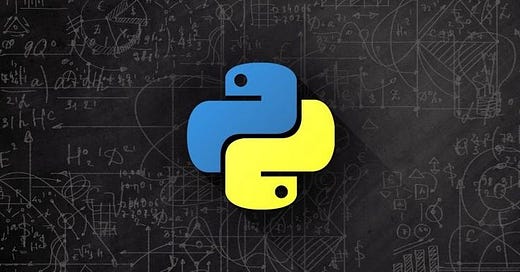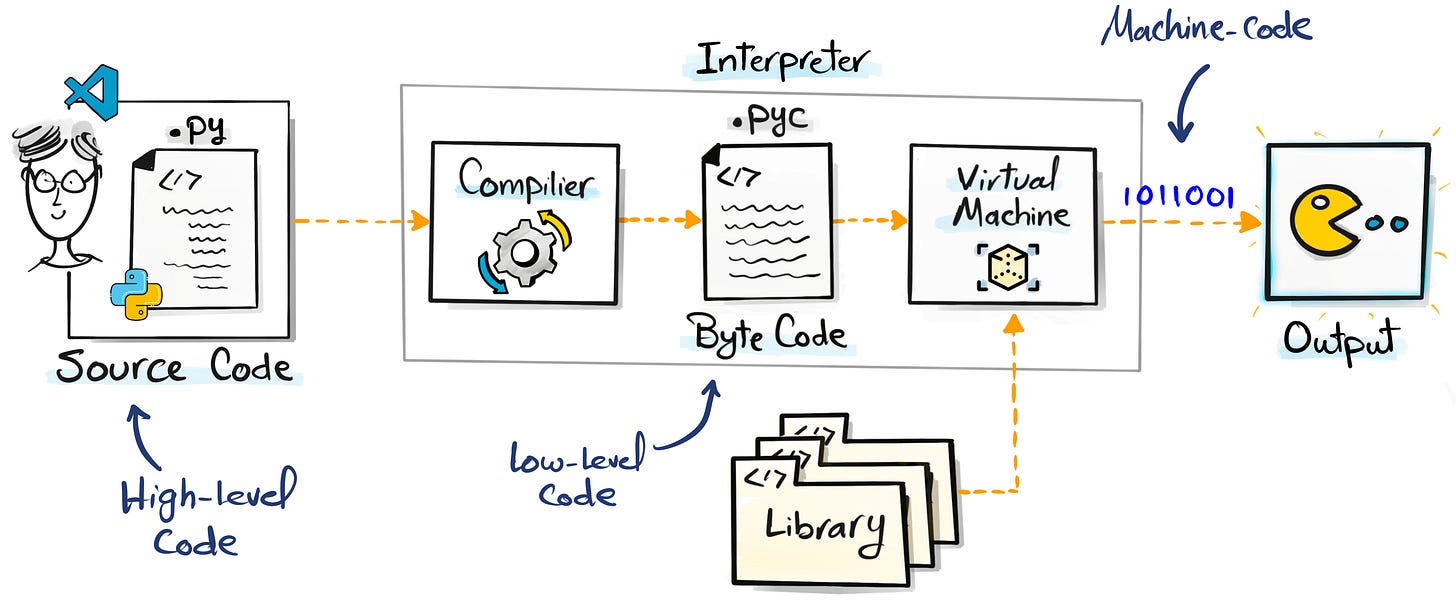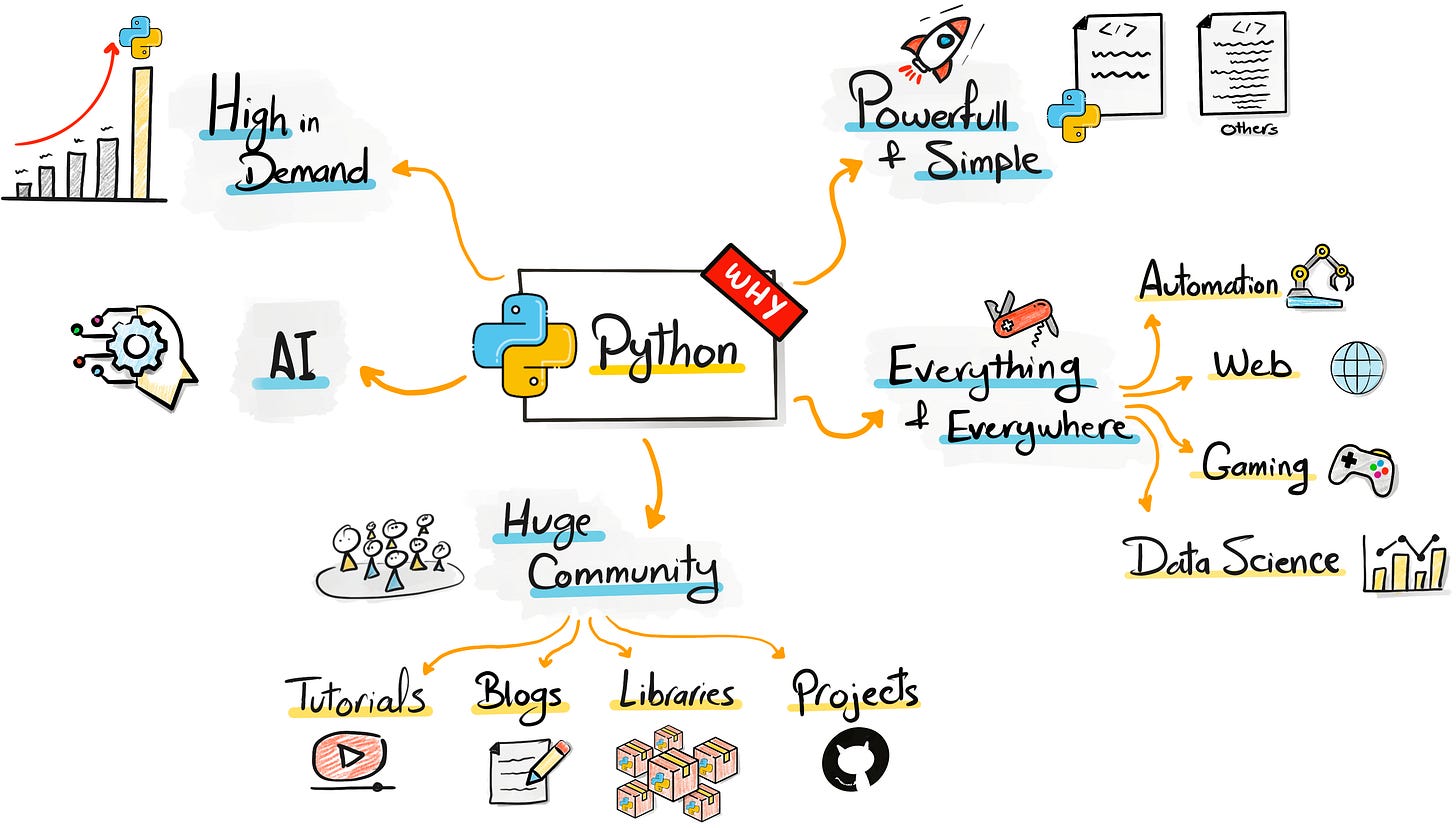🐍 Introduction to Python – The Language of the Future
What Is Python, Really? Why Learn It? How Do You Learn It?
Hey friends! 👋
If you've ever wondered what Python actually is, how it works, why it's everywhere and how to learn it? this post is for you.
So grab your favorite drink ☕, get comfy, and let’s start learning Python — together.
You ready?
Let’s go 💻
What Is a Programming Language?
Imagine saying, “Please calculate 5 + 5” to a computer.
It wouldn’t respond — because it doesn’t understand human language.
That’s where programming languages come in. They act as translators, allowing us to communicate instructions in a way computers can understand.
Like spoken languages, some programming languages are easier to learn than others — and Python is one of the most beginner-friendly.
Let’s break it down:
At the top, you’ve got natural languages — English, Spanish, Hindi. Super easy for humans, but totally useless to a computer.
Next, we have high-level programming languages like Python and JavaScript. These are made for us — humans. They’re easy to read, write, and understand. Python, in particular, is known for being almost like English.
Then there are low-level languages like Assembly or C. These give you much more control over the computer, but they’re much harder to write and understand.
And finally, at the bottom, is machine language — pure binary. This is what the computer actually understands. No one writes in this directly (unless you're feeling extra brave).
⚙️ How Python Actually Works (Behind the Scenes)
When you write Python code, you're writing in high-level language — human-friendly instructions.
Then, Python takes care of the rest:
It compiles your code into something called bytecode.
This bytecode gets sent to a virtual machine (basically a mini-computer inside your computer).
Finally, that machine spits out the result in good old binary —
101001— so your computer understands what to do.
You don’t have to worry about any of this, though. Python handles all the complexity for you, like a backstage crew working silently to make your show perfect.
So… Why Learn Python?
There are so many languages out there, so why Python?
Simple, but powerful: You can build big, serious stuff with just a few lines of code.
Use it for anything: Websites, automation, games, data, AI — Python’s got your back.
Massive community: You’re never alone. Tons of tutorials, blog posts, libraries, GitHub repos — even YouTube videos like mine 😉
Python powers AI: From ChatGPT to self-driving cars — Python is the language of the future.
High demand: From startups to tech giants like Google and Netflix, Python is everywhere. It’s used in data, AI, automation, web dev — you name it. Learning Python instantly makes you more valuable in today’s job market.
In short: Python is easy to learn, insanely useful, and opens tons of career doors. What’s not to love?
Your Python Journey (The Roadmap)
Now, here’s the part most beginners get stuck on: “Where do I start? There’s SO much!”
Here’s the truth: everyone starts at the same place — the Python core.
This is your foundation. It’s where you learn the basics like variables, data types, conditions, loops, and functions. This is where you get comfortable talking to your computer.
You’re not rushing. You’re building muscle.
But once that foundation is solid, the real question comes up:
“What do you want to do with Python?”
This is where your journey becomes your own.
Some people discover they love organizing data and building pipelines — they naturally flow into Data Engineering.
Others love analyzing trends, building dashboards, and telling stories with numbers — that’s the Data Science path.
Maybe you’re curious about robots, recommendations, or how AI writes poetry — then Machine Learning and AI is calling you.
Or maybe you just want to build things — websites, apps, tools — and bring your ideas to life. Welcome to Web Development.
You don’t need to figure it all out on Day 1. Learn the core. Try little projects. See what excites you.
The path will reveal itself as you walk it.
Final Thoughts
Learning Python isn’t just about writing code — it’s about unlocking your creativity, sharpening your problem-solving skills, and starting to think like a true builder.
So go ahead — open that first .py file. Write your first line. Don’t worry if it doesn’t work the first time. Break things. Google the errors. Ask ChatGPT. Laugh at the bugs. And most importantly — keep going.
Hey friends —
I'm Baraa - a data guy who loves teaching and simplifying complex topics. With 15+ years in data and analytics (including time at Mercedes-Benz), I share quick hand-drawn sketches, real-world projects, and clear, practical explanations.











I wish you’d upload more videos in the python series faster